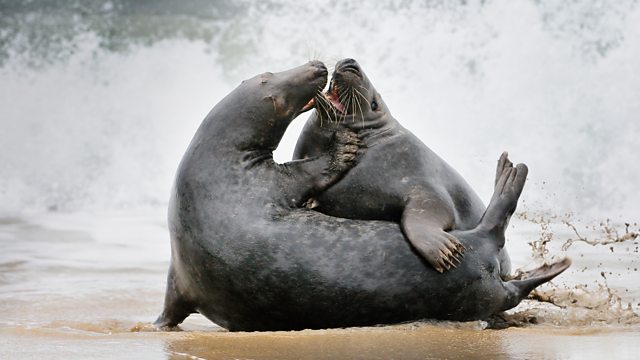
Episode 1
Rugged and beautiful, Scottish islands are the setting for wildlife spectacles like nowhere else in Scotland. Shaped by their relationship with the sea, these are wild, bountiful places.
Nearly 800 islands lie off the coast of Scotland, and these are some of the most biodiverse places in the country where the mix of low intensity agriculture, wild spaces and a diverse and rich ocean has benefited numerous species. From the Shetland Isles in the north to the Inner Hebrides in the south, these isles are teeming with life.
In the north west, sitting low in the Atlantic, are the remote Monach Islands, uninhabited since the 1940s. Now every autumn, the white sand beaches host the largest breeding colony of grey seals in Europe. More than 10,000 pups are born each year and they have just a few short weeks to get ready for independence.
Just a few kilometres to the east lie the Uists. From Berneray in the north to Eriskay in the south, these are Scotland’s lowest lying chain of islands. The wildlife here has a close and enduring relationship with the local people. The western shores of these isles are home to an incredibly rare habitat, found in few other places in the world - the machair. Low-intensity agriculture on rich shell sand soils allows wildlife to flourish, with huge populations of waders drawn to nest here. Tiny lapwing chicks can be seen foraging in the grassland, as their parents ward off curious neighbours.
In the shallow waters around Scotland’s islands, great underwater meadows can be found. Beds of seagrass, an incredibly important habitat for numerous species, provide an ideal nursery ground for shoals of young fish. While also buffering against the impact of storms and collecting huge quantities of carbon, locking it up in the sediments below. More than 90 per cent of these meadows have been lost due to human impacts.
Warmed by the gulf stream, the rich waters of the west coast are seen to attract the second largest fish in the world during the summer months, basking sharks. These huge fish come to feed on plankton every year. Nearly hunted to extinction here in the past, numbers of these ocean giants have been rising in recent years.
Last on
More episodes
Previous
You are at the first episode
Next
Credits
| Role | Contributor |
|---|---|
| Narrator | Thoren Ferguson |
| Executive Producer | Nigel Pope |
| Executive Producer | Jackie Savery |
| Director | Fergus Gill |
| Series Producer | Jon Morrice |
Broadcasts
- Sun 17 Sep 2023 21:00
- Tue 19 Sep 2023 20:00
- Fri 17 Nov 2023 20:00
- Mon 13 May 2024 20:00
- Sun 6 Oct 2024 20:00
- Wed 6 Nov 2024 08:00
Featured in...
![]()
Uncover Hidden Landscapes of the British Isles
Explore hidden gems and amazing wildlife in Britain's countryside.
![]()
Escape to Nature
Cast off the stress and relax with stunning images from the natural world.
![]()
Made in Scotland
Discover the landscape, humour and people of Scotland
![]()
Award winners
Selection of winners and nominees from BAFTA Scotland Awards
![]()
iPlayer Science and Nature Category :: Featured Episodes
iPlayer Science and Nature category featured programmes

